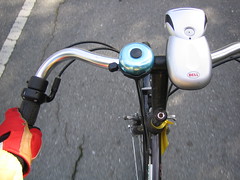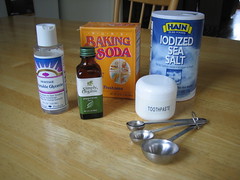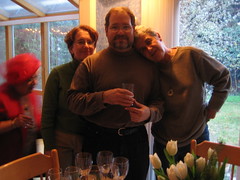My Compact Year
About 5 months into the Compact, I dreamt that I was at Crate & Barrel buying lamps and furnishings I didn't need, paying for them and walking out the door. At which point I thought to myself, "Oh no, I'm going to have to confess my purchases to the Compact Group." Thankfully I woke up.
I joined the Compact when the San Francisco Chronicle published the first article on the group, a month after the original "yuppies" conceived the idea of not buying anything new for a whole year. I joined because I, too, had made a similar New Year's resolution. The publicized group also had the allure of a movement and it was local to the Bay Area so I felt a kinship to the founders.
I followed the groups' criteria to the letter for half the year, before finding a loophole to exploit and late in the game I fell off the wagon entirely for a toaster oven. Yes, a mundane kitchen appliance. The Compact, however, was much more than not buying new stuff. It was about rethinking our consumer habits.
I also challenged the premises of the Compact. For instance did the rules forbid going to see a first run movie? No one answered that question, but a few days later someone did talk about being an avid user of Netflix. So renting movies was supported over buying DVDs, but first run movies were sort of a gray zone. Despite being a resource intensive, consumer driven industry, it was not, after all, a physical item.
The permitted new items included underwear and socks (utilitarian and not taken to excess), as well as household cleaning supplies, consumable sundries and safety items. Locally made artisanal items were permitted. We could also keep our magazine subscriptions, but not buy single magazines. The loophole I exploited was the category of health and safety items, under which I could justify bike lights, a pair of bike gloves, wrist friendly handlebars, a specialized backpack to "safely" transport my sparing gear to karate class by bike, sunglasses, reading glasses, a first aid kit and earthquake supply items that I decided to stock up on, including, yes, possibly, an excess of LED flashlights and a battery operated lantern.
I also made some shady exchanges by deciding to discontinue two of my magazine subscriptions, but buying 6 magazines over the year and 6 new books from independent publishers and Kepler's, our last, local independent bookstore.
My main motivation for joining the Compact was that I was spending a substantial amount of time, many evenings a week shopping online. Buying clothes and products was not even the time wasting part; it was the looking at stuff. Even if I couldn't afford or didn't want a new Timbuk2 bag, I still wanted to look at it just to keep up with the product line. Suitcases, too, attracted me. So much so, that I carry a tape measure and a list of the measurements of all the suitcases I own just so I don't spend too much time sizing up a suitcase in a store. It was likely to be exactly the same size as one I already own.
Joining the Compact put an instant stop to this constant hunting. The time I spent not shopping I replaced with time spent reading postings by Compact members and following up on links and resources. But it was a worthwhile exchange. Many of the posters were already experienced Compactors who were familiar with pioneer skills, had books to recommend, recipes to share, and in general, reinforced values that embodied a holistic eco awareness I craved.
These values and ideas were already taking the Compact beyond the vision of the original group. We were not, for instance, required to make our own cleaning supplies, but doing so was a source of much discussion. I was eager to try it, but then I realized I would have to go out and buy a bevy of plastic squirt bottles to put my concoctions in, when I already had a years supply of bulk cleaning spray at home.
What I did do was make my own shampoo using a baking soda paste followed by a rinse with apple cider vinegar diluted in water. The results were remarkable. My hair was squeaky clean, shiny and befitting of a TV commercial. What's more, I did not need to wash my hair nearly as often as I did before, only once a week in fact. This was a revelation to me. Shampoo companies had basically brain washed the public into thinking that its product is not only essential, but desirable for everyday use.
As it is a detergent, shampoo stimulates your scalp to produce grease in order to stave off the drying effect of the detergent. Thus shampoo creates the very conditions it was advertised to combat. What a scam. And then you have to switch shampoos after a while because the build-up renders it less effective. It is no wonder that when I organize a client's bathroom, I am likely to find six banker's boxes worth of sundries, most of which are hair and skin products. I also learned that petroleum based products, like baby oil are not absorbed by the skin, but sit on top, clogging the pores. Now I just rub on olive oil, after a shower, and have noticed much less drying of my skin.
The toothpaste industry, too, had suffered a misguided redirection in purpose. Where once toothpastes were meant to clean and disinfect the teeth, mouth and gums, a difference of opinion among dentist, over a new antibacterial ingredient, caused the dental association to change the requirements of toothpaste from "decontaminating of pathogenic bacterial biofilms" to merely "aid in removing food particles". As a result, the toothpaste industry changed its focus from effective cleaning of the teeth to enhancing the appearance of the teeth, thus opening the door to whiteners that actually dissolve enamel, plus sugar that makes the toothpaste taste better. Ugh.
But Compactors had a solution with another baking soda recipe. This time mixed with glycerin and a pinch of salt, made palatable by a few drops of mint. I was eager to try it, particularly since I had just learned that my favorite, family owned, natural ingredients toothpaste, Tom's of Maine, had been sold to the corporate behemoth Colgate.
The toothpaste recipe took a little getting used to because of the salty taste, but the graininess of the baking soda and salt made my teeth feel like they had been polished. Plus the baking soda, when dissolved in a solution, kills all "motile microorganisms" on contact, while the glycerin halts the "motility" of said organisms. After six months use, I couldn't wait to see what my dentist would say. Her only concern was that my recipe did not contain fluoride, but otherwise she felt that the cleaning job I was doing was so effective, she wouldn't want to change anything. Score another Compactor lifestyle coup.
When it came to gifts during my Compact year, I had the brilliant idea of introducing my friends to my Compact lifestyle by putting together gift baskets with samples of the toothpaste, ingredients for the shampoo and accompanying recipes that included using baking soda as a deodorant. Nor could I buy birthday cards, so I made my own, using photographs of each friend taken earlier that year. The results were not only personalized, but unexpectedly more personal in the message I ended up writing.
Following the Compactor regime allowed me to think more consistently in terms of ecological impact. For instance, sewing had long fallen by the wayside for many home sewers because clothes could be bought so cheaply now (due to lowcost labor overseas) that it wasn't worth the time. Now, I could justify the time I spent sewing because I was saving on the transportation and manufacturing costs to the environment of buying new clothes that were then shipped to me. And because I was at the thrift store, more often now, I got lucky and found some attractive fabric another sewer had donated, thus saving it from going to landfill. Sewing my own pair of pants added a unique item to my wardrobe and made me think about other things I could make from salvage material, instead of other things I wanted to shop for.
When I started coming home from the thrift shops with nice shirts and nearly new items, such as a thermos bottle just like the ones selling at Starbucks, Catherine wanted to come with me to buy clothes for her niece. After an hour at Savers, I looked for her and found she had filled a shopping cart full of clothes for herself as well.
"I had a revelation in there," she reported later. She had been intently studying her financial health and had realized that where she might normally drop several hundred dollars on clothes for work at Nordstrom's, here at the thrift store, she had spent a little over $50 for a cart full of clothes that included several wearable work items. Considering all the perfectly good clothes I had helped clients haul away to the Goodwill, it wasn't surprising that there would be clothes there that looked better than what was in our own closets.
Not only that, but there was no packaging in the presentation of items sold at thrift stores, apart from the occasional generic plastic bag for small items grouped together. (So why, one might ask, did I fall for a toaster oven, complete with Styrofoam packaging and giant cardboard box? I don't know exactly, but I was in Mervyns shopping for bras and I saw the small convection toaster oven for a very low price. I had long wanted one because they use less energy than conventional ovens. Once I bought it, I was going to take it back, but I kept taking it out of the box just to try it one more time. Finally I realized that using it would mean I could dispense with the microwave as I had become convinced that microwaves deplete the nutritious value of foods, especially the very foods that are supposed to be good for you, like broccoli.)
When the Christmas season loomed, Catherine and I decided we didn't want to buy a tree, because they were sprayed with so much pesticide. Then we made the radical decision not to buy each other any gifts to go under the non-existent tree. This was a category in which we tended to go overboard. Catherine warned all her work people that she had decided to eschew the material traditions of the season and would not be buying gifts.
We watched ourselves as our stress level dropped and we decided to host a party, on Christmas Eve, to fill the house with friends and food. On the day of Christmas itself, Catherine and I slept in and then sat in bed reading our books. Around ten a.m., I turned to her and said "Happy Christmas". We looked at each other for a delicious moment, then congratulated ourselves for having the audacity to convey our love without the aid of a single material object.
As the anniversary of the Compact approached, articles were published, in all kinds of publications, following up on how we had done. Apart from some specialty hardware items, the Compactors interviewed had largely stuck to it and we're renewing their vows. Inspired by the example of these first year Compactors, membership jumped from the 1,000, that had pulled the group along for most of the year, to over 7,500. It sure was looking like a movement, and an international one at that.
Published concurrently at energy bulletin
Labels: compact, frugality, sustainable







1 Comments:
Last year I took courage and decided to do everything I always wish to do. I left my job and started travelling. Today I am in an apartment rental in buenos aires. Doing this I discovered that many problems I had (like shopping) have disappear without any effort, changing our routine helps us to eliminate bad habits I suppose.
Post a Comment
<< Home